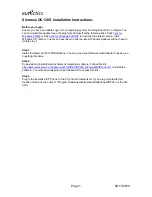
Configuring LAN resources
671
Programming Operations Guide
Configuring multiple IP addresses for the LAN interface
Adding an additional IP address
1
On the navigation tree, click the
Resources
key and click the
LAN
key.
2
Click the heading of the LAN resource you want to modify (for example, LAN1).
The LAN Summary screen appears.
3
Click the
Additional IP Address
tab.
The Additional IP Address screen appears.
4
On the
Configuration
menu, click
Add Additional IPAddress
.
The Additional IP Address screen appears.
5
Configure the Additional IP Address parameters according to the information in the table
below.
6
Click the
Save
button.
Note:
Setting the LAN connection speed to 100 Mbit/s does not reduce performance.
However, the CPU is more efficient if you limit your incoming traffic to 10 Mbit/s.
To increase your CPU performance, set the connected external LAN hub or switch to
10 Mbit/s
or to
Auto Sense
.
Note:
If you enable LAN Traffic Smoothing, the connection type defaults to Auto Sense.
Therefore, you do not need to set the connection speed on the external LAN hub or switch.
Note:
Refer to
“Additional IP addresses are not blocked” on page 725
for
important information regarding additional IP addresses for the LAN
interface.
Table 174
Additional LAN IP address parameters
Attribute
Description
Range (A#)
View the Additional IP Address identifier.
The Range number uniquely identifies an Additional IP Address. The value for this setting must
follow certain conventions. The Range number does not have any significance, other than
uniquely identifying an Additional IP Address.
IP Address
Enter the Additional IP address of the LAN interface in the following format: 255.255.255.255.
SubNet Mask
Enter the subnet mask of the LAN interface in the following format: 255.255.255.255.
If you do not know your subnet mask address, contact your system administrator or your
Internet service provider.
Summary of Contents for BCM 3.7
Page 4: ...4 Software licensing N0008589 3 3...
Page 32: ...32 Contents N0008589 3 3 W 937 Index 939...
Page 46: ...46 Tables N0008589 3 3...
Page 64: ...64 How to get help N0008589 3 3...
Page 90: ...90 Manually activating Telnet N0008589 3 3...
Page 116: ...116 Delayed system restart N0008589 3 3...
Page 194: ...194 Configuring a data module N0008589 3 3...
Page 276: ...276 Setting line telco features N0008589 3 3...
Page 310: ...310 Using COS passwords N0008589 3 3...
Page 364: ...364 Enhanced 911 E911 configuration N0008589 3 3...
Page 380: ...380 Renumbering DNs N0008589 3 3...
Page 398: ...398 Saving wizard pages on your computer N0008589 3 3...
Page 458: ...458 Voice Mail settings N0008589 3 3...
Page 488: ...488 Setting system telco features N0008589 3 3...
Page 508: ...508 Other programming that affects public networking N0008589 3 3...
Page 522: ...522 PRI networking using Call by Call services N0008589 3 3...
Page 592: ...592 Monitoring Hunt groups N0008589 3 3...
Page 636: ...636 Configuring Double Density N0008589 3 3...
Page 640: ...640 Using the Network Update Wizard N0008589 3 3...
Page 666: ...666 Importing and Exporting DHCP data N0008589 3 3...
Page 722: ...722 Restarting the router N0008589 3 3...
Page 726: ...726 Important Web Cache considerations N0008589 3 3...
Page 748: ...748 Configuring an Interface with NAT N0008589 3 3...
Page 794: ...794 IPSec N0008589 3 3...
Page 818: ...818 Configuring the Policy Agent characteristics N0008589 3 3...
Page 832: ...832 Firewall rules for Business Communications Manager with Dialup interfaces N0008589 3 3...
Page 876: ...876 ISDN Programming N0008589 3 3...
Page 1004: ...1004 Index N0008589 3 3...
















































